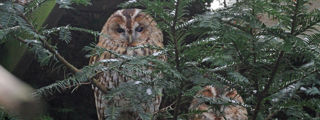
Tawny Owl
Strix aluco
This is a medium sized owl, with females being around 25% heavier than males. Tawny owls have a large round head with no ear tufts, with large dark eyes.
Plumage can be variable, but the most common colour morph is of a chestnut brown colour with dark and lighter tones helping to camouflage the bird. Their tail is short and their toes are feathered and very powerful.
Behaviour
Mainly nocturnal and highly territorial, forming monogamous pairs. They don’t tend to migrate, defending their breeding territories with calls (hoo-ho-ho) and male territorial displays (sometimes leading to fights).
This territorial activity peaks during Autumn, coinciding with the timing of the dispersal of young birds. Eggs are normally laid between February and March. During the day they roost in dense foliage, tree trunk or even sometimes old building and sheds.
UK Status
Widespread breeding species throughout England, Wales and Scotland. Has been declining in the UK since the 1970s which led to being added to the RSPB’s Amber List of Birds of Conservation Concern in 2015.
Threats
Like most birds in the UK, is protected under the Wildlife and Countryside Act (1981) making it illegal to kill, injure or capture a bird, and damaging or destroying their nests.
Distribution
Tawny Owls can be found continuously across central and parts of northern Europe into Russia, and Iran. In Europe they are absent from Ireland, and parts of northern Sweden and Finland. Kazakhstan forms a gap in their range, which then continues into parts of Uzbekistan and Afghanistan.
Habitat
Preferred habitat is woodland, particularly broad-leaved woodland. Can also be found in relatively urban and agricultural areas.
Diet
Is the least specialised owl species with a huge range of prey species. Preference for small mammals (rodents such as mice and voles), but also eat birds, amphibians, reptiles, insects and sometimes fish.
Family facts
The number of prey items taken by tawny owls worldwide is thought to be over 400 different species.
In Shakespearean times, Tawny Owls were often seen as an omen of bad luck.

